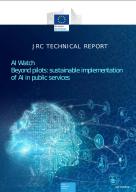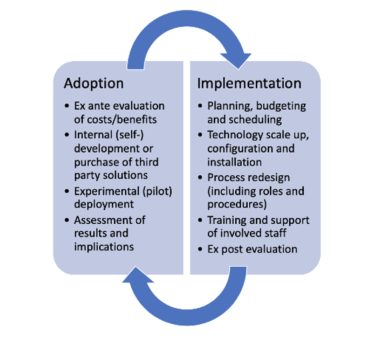Description
The report "Beyond pilots: Sustainable implementation of AI in public services" is part of AI Watch activities towards the investigation of the effective AI uptake in the public sector. Based on the knowledge resulting from the collection of 230 AI use cases from EU (Member States and Associated States) national, regional and local government, this report introduces the concept of Artificial Intelligence (AI) appropriation in the Public Sector. It describes and investigates it under several aspects, also with an overview of the status in China and USA.
AI appropriation is seen as the combination of two logically distinct phases, respectively named adoption and implementation, which reflect the two concepts of “governing with AI” on the one hand, and “governing AI” on the other. Introducing this concept allows the development of a research approach that goes beyond the analysis of only individual, pilot AI projects.
While highlighting the differences between the implementation and the adoption of AI, the focus here is also on the idea that the global process of AI appropriation, in order to be sustainable, needs to be cyclical with these two phases alternating and repeating across time.
Achieving a diffused adoption and implementation of AI in the European Public Sector is not free of challenges. One crucial example is the risk of proliferation of approaches and interpretations, or the lack of concrete and operationalized ethical AI guidelines to be easily adopted. Also to tackle these challenges, the report proposes recommendations that would represent the baseline for a more in-depth study on a ‘road towards the adoption of AI in the public sector’:
• the necessity of a more robust integration of AI with data policies
• the increasingly important question about the need of “explainability” of AI (also named XAI)
• the need to broaden the current perspectives of innovation procurement models, at the service of smart AI purchasing inside the European public administration
This report is a first attempt to highlight that AI is not only about algorithms, data, and computing power, but and mostly about people and citizens. Therefore, its appropriation may never be completely successful if it is only done “for” the users, as it needs to be done together “with” the users.


